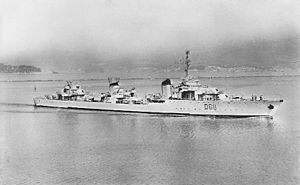Battle of Ist facts for kids
Quick facts for kids Battle off Ist |
|||||||
|---|---|---|---|---|---|---|---|
| Part of the Adriatic Campaign of World War II and Battle of the Mediterranean | |||||||
 Free French destroyer Le Terrible |
|||||||
|
|||||||
| Belligerents | |||||||
| Commanders and leaders | |||||||
| Strength | |||||||
| 2 destroyers | 2 torpedo boats 2 corvettes 3 minesweepers 1 freighter |
||||||
| Casualties and losses | |||||||
| None | 150 killed and wounded 1 corvette sunk 1 freighter sunk 1 torpedo boat damaged |
||||||
The Battle of Ist was a sea battle during World War II. It happened on February 29, 1944, near the island of Ist in the Adriatic Sea. The fight was between two Free French Naval Forces destroyers and a group of German navy ships.
The German ships included two corvettes, two torpedo boats, and three minesweepers. They were protecting a large cargo ship, called a freighter. In the battle, the French ships successfully sank the German freighter and one corvette. They did this without losing any of their own ships. After the battle, the French ships left the area.
Contents
Why the Battle Happened
In 1944, the Royal Navy (British navy) set up a special group of ships. This group was called the 24th Destroyer Flotilla. It was based in Bari, Italy. The group had ten ships, including three French destroyers: Le Fantasque, Le Terrible, and Le Malin.
The French ships, led by Captain Pierre Lancelot, were in charge of the northern part of the Adriatic Sea. The British ships covered the southern part. The French destroyers were known for being very fast. They were some of the fastest ships in the world at that time. This speed helped them quickly respond to enemy movements and attack targets.
The Fight Begins
On February 29, the French destroyers left Manfredonia, a town north of Bari. They sailed north into the Adriatic Sea. At the same time, a group of German ships left Pula, a city in Croatia. This German group was a convoy, meaning they were traveling together for protection.
The German convoy included:
- Two torpedo boats, TA36 and TA37. These were originally Italian ships.
- Two submarine chasers, UJ201 and UJ205. These were also originally Italian ships.
- Three small minesweepers.
- A large cargo ship, the Kapitan Diederichsen, which weighed 6,311 tons.
The German escort ships were quite new to battle. This was only their second mission. Both the French and German groups were sailing towards each other in the dark night. There was very little moonlight.
First Contact and Attack
At 9:35 PM, the radar on Le Terrible picked up targets further north. The French ships sailed towards them. Once they confirmed the targets were enemy ships, the French opened fire. They started shooting from about 9,000 yards away, west of Ist Island. This caught the Germans by surprise.
Le Malin fired at the biggest ship, which was the freighter. It quickly hit the freighter. The Germans tried to create a smoke screen to hide. But the fast French destroyers used their radar to get closer.
Le Terrible hit the freighter more times. Meanwhile, Le Malin focused on the closest German escort ship.
Sinking the Freighter and a Corvette
From about 4,500 yards away, Le Terrible fired a group of torpedoes. The first group missed. But one torpedo from the second group hit the freighter right in the middle. This caused the freighter to catch fire badly. It then floated without control.
At the same time, UJ201 was hit by Le Malin's powerful shells. The French ship had found its target. The German corvette was hit six more times and became a burning wreck. Le Malin got close enough to launch more torpedoes. One torpedo hit, causing the ship's ammunition storage to explode. The explosion lit up the sky. The UJ201 sank immediately, and everyone on board was lost.
Both Le Terrible and Le Malin then attacked the remaining German escort ships. TA36 was almost hit many times and then hit lightly on its front end. TA37 was hit in its engine room and caught fire. Its speed dropped very quickly.
Captain Lancelot was about to finish off the damaged German ship. But he saw some fast-moving shapes that looked like small, fast enemy boats (called E-boats). He decided it was safer to pull back. It turned out these shapes were actually the German minesweepers. They were coming to help the crew of the burning freighter and look for survivors from the UJ201. Lancelot then headed south back to port.
What Happened Next
The Kapitan Diederichsen freighter stayed afloat for a while. An attempt to tow it failed. The German escort ships rescued the survivors from the freighter. The heavily damaged TA37 was successfully towed and made it back to Pola.
The French ships stayed in the Adriatic Sea for several more months. They attacked the island of Zante. On March 19, they sank two German transport ferries, SF273 and SF274. They also badly damaged two others. In August, the French destroyers took part in Operation Dragoon. This was the Allied invasion of Southern France.
 | James B. Knighten |
 | Azellia White |
 | Willa Brown |

